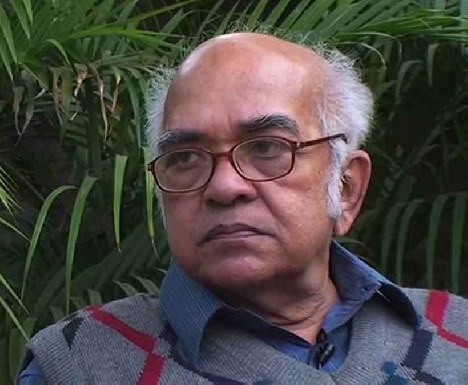The Tagore Program on Literature, Culture and Philosophy at UC Berkeley invites you for a talk by the renowned critic and cultural commentator, Samik Bandyopadhyay.
_________________
DATE: Tuesday, Nov 10, 2020
TIME: 9am Berkeley | 5pm London | 10pm Lahore | 10:30pm Kolkata | 11pm Dhaka | Calculate Your Local Time
This event will also be live streamed on the Institute's FB page: ISASatUCBerkeley
_________________
Abstract
Halfway through Naibedya [lit. offerings to the Divinity], a collection of spiritual poems, published in 1901, most of them calling for unconditional submission to the will of God, Tagore suddenly bursts into a series of poems in a strikingly different spirit, turning the benevolent, infinitely merciful deity to an avenger against the misdeeds of temporal authority, calling on Him to hand over to me your deadly arrows, / Your endless store of weaponry. Train me in the use of weapons, / O Master of warfare. Let your powerful paternal affection / Ring forth into hard instructions. / Dress me up in the dignity of a new warrior, / Difficult responsibilities, unbearably hard agony; let wounds be my ornaments. / . . . Dont cuddle me in the tender lap of sentiments. / Make me free to stride in the field of action. The sequence reaches a culmination in a poem, opening with the line, The Centurys Sun sets in a cloud of blood, and prophesying a festival of violence, in which the merciless dragon of civilization has raised its vicious hood, /. . . its hidden fangs loaded with venom. / Devoid of all shame, / the egregious crime of nationalism / seeks to sweep religion away in a flood of force. Once World War I broke out, his critique of nationalism in a series of lectures in China, Japan and the USA drew strong reactions.
It was in the Naibedya poems, that he first focused on Imperialism riding on Nationalism as a Crisis in Civilization, a theme he went on developing through his later years in poetry, fiction, drama and miscellaneous prose. He distanced himself from the mainstream nationalist anticolonial movement in his own country from his civilizational concern, as it grew with the Wars.
In 1920, in a letter to Tagore, Susan Owen, mother of the British war poet, Wilfred Owen, killed in action a week before Armistice in 1918, told him that the last words her son spoke to her when he was taking leave of her on the way to the front were the opening lines of a Gitanjali poem: When I go from hence let this be my parting word that what I have seen is unsurpassable. His shift from that position in 1937, with the forebodings of World War II in the Spanish Civil War is registered in a poem in Prantik (1937), significantly dated Christmas Day 1937: As the dragons spout venom all around, / Tender words of peace will sound a banal mockery. / Hence before I bid farewell, / Let me send out a call to / All who are preparing in their homes / For the battle against the demons. The militancy of resistance was a reversal of the last words in Gitanjali cherished by Owen.
In my presentation, I propose to document Tagores reading of the Wars as a crisis of civilization, raising vital questions about civilization, capitalism, industrialization and science.
Speaker Bio
Samik Bandopadhyay is a renowned critic and cultural commentator who has worked closely on film and theatre in several languages and forms, particularly Bengali and Hindi. He has translated plays and fiction by Badal Sircar and Mahasweta Devi; contributed introductions to plays by Vijay Tendulkar, G P Deshpande, and reconstructed for publication, film scripts for films made by Shyam Benegal and Mrinal Sen.
Samik Bandyopadhyay was the Rabindranath Tagore National Fellow at the School for Arts and Aesthetics, JNU, New Delhi (2015-2017), Member, Publication Committee, Sangeet Natak Akademi, New Delhi (20162018). He was Visiting Professor, SAA, JNU, New Delhi (2005-2012, 2014); Visiting Professor: ICCR Chair at the Department of Theatre Studies; Freie Universität, Berlin (April-July 2014); Vice-Chairman, National School of Drama (2006-2010); and Member National School of Drama Society (2005-May 2014).
Additionally, he was Regional Editor, Oxford University Press, Calcutta, 1973-82, and was Founder-Editor, Seagull Books, 1982-88. More recently he was Founder-Editor, Thema, a small publisher based in Kolkata (estab. 1988).
His vast experience includes stints as Producer Emeritus, All India Radio and Doordarshan, 1989-92. Research Professor, Asiatic Society, Calcutta, 1995-97; Member, General Council, Sangeet Natak Akademi (2 consecutive terms) and Central Board of Film Certification (1970-80); Member, 14-Member Indian Delegation to the East-West Theatre Seminar organized by the International Theatre Institute, New Delhi 1966; Panelist at seminars on Indian Theatre as part of Festivals of India in USSR (Tashkent 1987) and Germany (Berlin 1992).
He has translated plays and fiction by Badal Sircar and Mahasweta Devi; contributed introductions to plays by Vijay Tendulkar, Mahesh Elkunchwar, G P Deshpande, Satish Alekar; and reconstructed for publication, filmscripts for films made by Shyam Benegal and Mrinal Sen. He has contributed several essays in numerous film and theatre periodicals in English and Bengali, has interviewed Satyajit Ray, Mrinal Sen, Mahasweta Devi, Richard Attenborough, Natalie Sarraute, Salman Rushdie, Derek Malcolm, Reinhard Hauff, etc. for Film Society periodicals and All India Radio and Doordarshan; several of these interviews have been later included in books.
Mr. Bandopadhyay received an M.A. in English Literature from Calcutta University in 1961.
More about Samik Bandopadhyay on his wiki page HERE.
_________________
Launched in Fall 2019, and housed in the Institute for South Asia Studies, the Tagore Program on Literature, Culture and Philosophy at UC Berkeley, is the first of its kind in the US. Designed to showcase the life and legacy of Rabindranath Tagore, the program sponsors talks and workshops on Tagore, as well as semester-long visiting professorships in Tagore Studies at UC Berkeley. Read more about the program HERE.
_________________
Like us on FACEBOOK
Follow us on TWITTER
The event is FREE and OPEN to the public.

